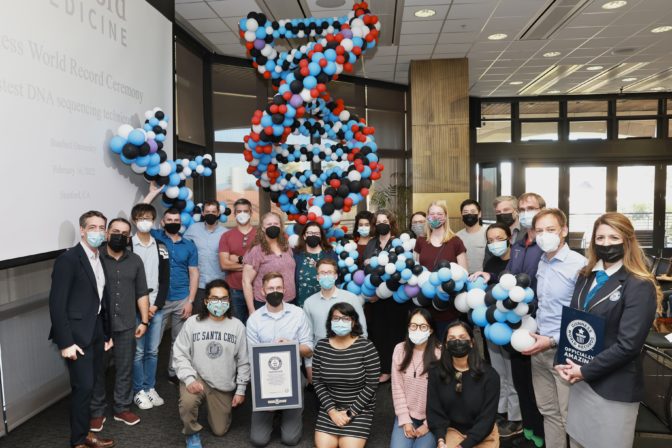Guinness World Record Awarded for Fastest DNA Sequencing — Just 5 Hours

Guinness World Records this week presented a Stanford University-led research team with the first record for fastest DNA sequencing technique — a benchmark set using a workflow sped up by AI and accelerated computing.
Achieved in five hours and two minutes, the DNA sequencing record can allow clinicians to take a blood draw from a critical-care patient and reach a genetic disorder diagnosis the same day. The recognition was awarded by a Guinness World Records adjudicator Wednesday at Stanford University’s Jen-Hsun Huang Engineering Center, named for NVIDIA’s founder and CEO, a Stanford alumnus.
The landmark study behind the world record was led by Dr. Euan Ashley, professor of medicine, of genetics and of biomedical data science at the Stanford School of Medicine. Collaborators include researchers from Stanford, NVIDIA, Oxford Nanopore Technologies, Google, Baylor College of Medicine and the University of California at Santa Cruz.
 Caption: An adjudicator from Guinness World Records presented the record to the project’s collaborators this week. Image credit: Steve Fisch, courtesy of Stanford University.
Caption: An adjudicator from Guinness World Records presented the record to the project’s collaborators this week. Image credit: Steve Fisch, courtesy of Stanford University.
“I think we are in unanimous agreement that this is nothing short of a miracle,” said Kimberly Powell, vice president of healthcare at NVIDIA, at the event. “This is an achievement that did go down in the history books, and will inspire another five and 10 years of fantastic work in the digital biology revolution, in which genomics is driving at the forefront.”
Diagnosing With a Genome in Record Time
The researchers achieved the record speed by optimizing every stage of the sequencing workflow. They used high-throughput nanopore sequencing on Oxford Nanopore’s PromethION Flow Cells to generate more than 100 gigabases of data per hour, and accelerated base calling and variant calling using NVIDIA GPUs on Google Cloud. A gigabase is one billion nucleotides.
“These innovations don’t come from one individual, or even one team,” said Greg Corrado, distinguished scientist at Google Research, at the event. “It really takes this group of people coming together to solve these problems.”
To accelerate every step — from Oxford Nanopore’s AI base calling to variant calling, where scientists identify the millions of variants in a genome — the researchers relied on the NVIDIA Clara Parabricks computational genomics application framework. They used a GPU-accelerated version of PEPPER-Margin-DeepVariant, a pipeline developed by Google and UC Santa Cruz’s Computational Genomics Laboratory.
“I believe that the innovations that we’ll see in biology and medicine in the coming century are going to depend on this kind of collaboration much more than the siloed R&D centers of the past,” Corrado said.
New Possibilities for Patient Care
Ultra-rapid genome sequencing isn’t about setting world records. Cutting down the turnaround for a genetic diagnosis from a couple weeks to just a few hours can provide doctors with rapid answers needed to treat critical care patients, where every second counts.
And, as the technology becomes more accessible, more hospitals and research centers will be able to use whole genome sequencing as a critical tool for patient care.
“Genomics is still at the beginning — it’s not the standard of care,” said Powell. “I believe we can help make it part of the standard by reducing the cost and the complexity and democratizing it.”
Not content with the five-hour record, the team is already exploring ways to decrease the DNA sequencing time even further.
“There’s one promise we will make. We will smash this record very quickly in collaboration with Euan and his team, and NVIDIA and Google,” said Gordon Sanghera, CEO of Oxford Nanopore Technologies.
Hear more about this research from Dr. Euan Ashley by registering free for NVIDIA GTC, where he’ll present a talk titled “When Every Second Counts: Accelerated Genome Sequencing for Critical Care” on Tues., March 22 at 2 p.m. Pacific.
Subscribe to NVIDIA healthcare news here.
The post Guinness World Record Awarded for Fastest DNA Sequencing — Just 5 Hours appeared first on The Official NVIDIA Blog.


Leave a Reply